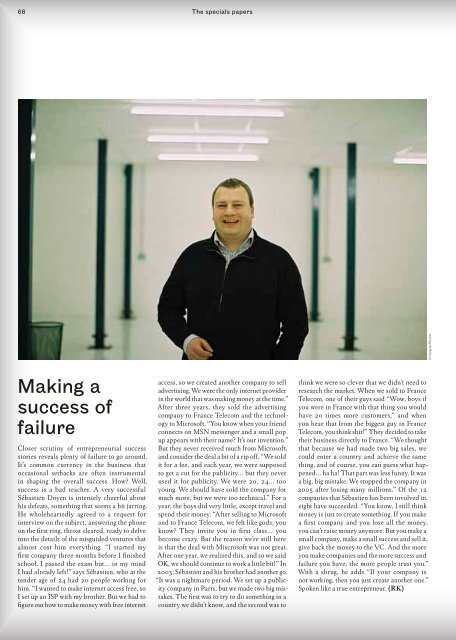Create successful ePaper yourself
Turn your PDF publications into a flip-book with our unique Google optimized e-Paper software.
68 <strong>The</strong> specials papers<br />
Making a<br />
success of<br />
failure<br />
Closer scrutiny of entrepreneurial success<br />
stories reveals plenty of failure to go around.<br />
It’s common currency in the business that<br />
occ<strong>as</strong>ional setbacks are often instrumental<br />
in shaping the overall success. How? Well,<br />
success is a bad teacher. A very successful<br />
Séb<strong>as</strong>tien Doyen is intensely cheerful about<br />
his defeats, something that seems a bit jarring.<br />
He wholeheartedly agreed to a request for<br />
interview on the subject, answering the phone<br />
on the fi rst ring, throat cleared, ready to delve<br />
into the details of the misguided ventures that<br />
almost cost him everything. “I started my<br />
fi rst company three months before I fi nished<br />
school. I p<strong>as</strong>sed the exam but… in my mind<br />
I had already left!” says Séb<strong>as</strong>tien, who at the<br />
tender age of 24 had 20 people working for<br />
him. “I wanted to make internet access free, so<br />
I set up an ISP with my brother. But we had to<br />
fi gure out how to make money with free internet<br />
access, so we created another company to sell<br />
advertising. We were the only internet provider<br />
in the world that w<strong>as</strong> making money at the time.”<br />
After three years, they sold the advertising<br />
company to France Telecom and the technology<br />
to Microsoft. “You know when your friend<br />
connects on MSN messenger and a small pop<br />
up appears with their name? It’s our invention.”<br />
But they never received much from Microsoft,<br />
and consider the deal a bit of a rip off. “We sold<br />
it for a fee, and each year, we were supposed<br />
to get a cut for the publicity… but they never<br />
used it for publicity. We were 20, 24… too<br />
young. We should have sold the company for<br />
much more, but we were too technical.” For a<br />
year, the boys did very little, except travel and<br />
spend their money. “After selling to Microsoft<br />
and to France Telecom, we felt like gods, you<br />
know? <strong>The</strong>y invite you in fi rst cl<strong>as</strong>s… you<br />
become crazy. But the re<strong>as</strong>on we’re still here<br />
is that the deal with Miscrosoft w<strong>as</strong> not great.<br />
After one year, we realised this, and so we said<br />
OK, we should continue to work a little bit!” In<br />
2003, Séb<strong>as</strong>tien and his brother had another go.<br />
“It w<strong>as</strong> a nightmare period. We set up a publicity<br />
company in Paris, but we made two big mistakes.<br />
<strong>The</strong> fi rst w<strong>as</strong> to try to do something in a<br />
country we didn’t know, and the second w<strong>as</strong> to<br />
think we were so clever that we didn’t need to<br />
research the market. When we sold to France<br />
Telecom, one of their guys said “Wow, boys if<br />
you were in France with that thing you would<br />
have 20 times more customers,” and when<br />
you hear that from the biggest guy in France<br />
Telecom, you think shit!” <strong>The</strong>y decided to take<br />
their business directly to France. “We thought<br />
that because we had made two big sales, we<br />
could enter a country and achieve the same<br />
thing, and of course, you can guess what happened…<br />
ha ha! That part w<strong>as</strong> less funny. It w<strong>as</strong><br />
a big, big mistake. We stopped the company in<br />
2005 after losing many millions.” Of the 12<br />
companies that Séb<strong>as</strong>tien h<strong>as</strong> been involved in,<br />
eight have succeeded. “You know, I still think<br />
money is just to create something. If you make<br />
a fi rst company and you lose all the money,<br />
you can’t raise money anymore. But you make a<br />
small company, make a small success and sell it,<br />
give back the money to the VC. And the more<br />
you make companies and the more success and<br />
failure you have, the more people trust you.”<br />
With a shrug, he adds “If your company is<br />
not working, then you just create another one.”<br />
Spoken like a true entrepreneur. (RK)<br />
© Grégoire Pleynet
















